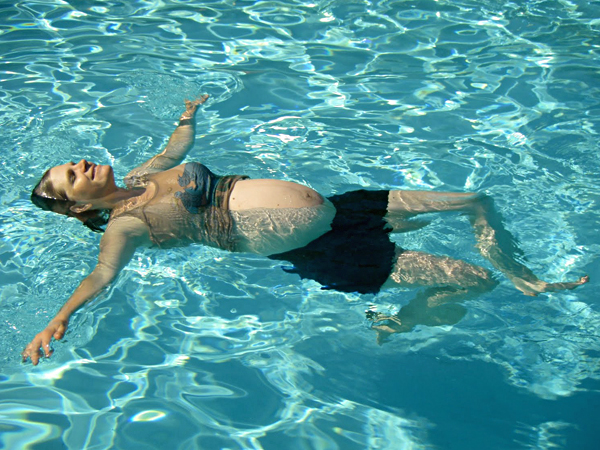During pregnancy, there is a whole new life inside a woman so exercise is probably the last thing in the mind. When entering a pool, weight is only a tenth of actual weight and this is something that works in the favour to swim during pregnancy. Being weightless in the water is amazing. Swimming could be the best exercise for a pregnant lady as it can take care of many aches and pains that are associated with pregnancy.
In this article:
Is it Safe?
Swimming During Pregnancy: Benefits
Swimming During Pregnancy: Safety Tips
Pregnancy Swimwear
Swimming Workouts During Pregnancy
When to Stop?
Precautions to Take During Swimming
All You Need to Know about Swimming During Pregnancy
Is it Safe?
Thinking of swimming as an exercise during pregnancy and the first thought that crosses one’s mind is, can pregnant women swim? Fortunately, swimming is a highly recommended exercise for pregnant women, as it helps maintain health in a profoundly relaxing manner. However, if there are certain complications or the possibility of a high-risk pregnancy, then certain precautionary measures are necessary. If doing prenatal swimming, there is no reason to shouldn’t continue during this period, unless medically advised not to. It would be challenging to learn swimming during pregnancy, though. Don’t exert the body beyond its limits and understand how much the body can give in to exercise.
Swimming During Pregnancy: Benefits
- Swimming is the perfect exercise for pregnant women to maintain weight.
- It is a low-impact exercise that benefits cardiovascular health.
- It increases strength, tones muscles, and improves blood circulation.
- It reduces the stress on the spine and surrounding muscles.
- Swimming helps to strengthen muscles and the functionality around the shoulders and spine.
- It helps a pregnant woman to relax and lower fatigue levels.
- Swimming is also known to improve sleep quality.
- It is better than other exercises since it is easy on the ligaments and joints of a pregnant woman.
Swimming During Pregnancy: Safety Tips
Swimming during pregnancy –
- First trimester – during this, ideally swim for 30 minutes every day, provided you have the doctor’s approval and have strength. Start the day with a swim and morning nausea will vanish while improving the overall strength.
- Second trimester – as the baby size grows and the body becomes heavier, most mothers-to-be abandon the swimming or reduce the frequency. If the back is acting up, do the backstroke since it will help to lie on the back and won’t affect the blood flow too. Buy a larger and a more accommodating swimsuit if the present one is cramping the swimming style.
- Third trimester – if you want to reduce the stress on the back muscles, breaststroke is the best style to use. It also works on the chest muscles and helps elongate it. Using a snorkel is also a good idea as it helps to relieve neck pressure. Be careful while walking on wet surfaces and use anti-slip footwear.
Pregnancy Swimwear
As the stomach expands the favorite swimsuit will no longer be able to hold the body. But you can try out some cute pregnancy bathing suits specially made for pregnant women. A two-piece suit gives a lot of space for the growing baby, so try it. Also, opt for a maternity swimsuit if not comfortable flaunting the bloated tummy. Check with the regular swimwear brand for one, as maternity swimwear is quite fashionable.
Swimming Workouts During Pregnancy
There are many pregnancy swimming exercises to try in the pool. In fact, prepare with a basic workout before stepping into the water. Speak to the instructor and brief about the condition for designing a suitable regime.
If occasionally swum earlier, begin slowly and gradually and increase the duration and number of laps. The key is to remain comfortable during the session and work up a moderate speed that does not make breathless. Double breast-stroke and frog kicks are ideal for beginners.
If a regular swimmer before pregnancy and the doctor has green-signaled it, continue the daily workout. Carry out 5 to 6 sets of 4 laps each using a single style or alternating between different ones to give a complete work out to the body.
When to Stop?
If there are warning signs, seek help and leave the pool immediately –
- Vaginal bleeding
- Pain in the abdomen
- Fluid loss
- Uterine contractions
- Dizziness, light-headedness or breathlessness
- Irregular heartbeats
Overall, if women have had multiple miscarriages, ruptured membranes, or any heart disease, they should avoid swimming during pregnancy or seek medical advice before starting.
Precautions to Take During Swimming
Swimming is an excellent way to exercise the body and relax at the time but following precautions should be taken –
- Make sure to keep the body hydrated enough if swimming for 30 minutes or more, by drinking fluid and glucose supplements.
- Do not jump or dive into the pool as this could cause harm to the baby and mother.
- Avoid swimming if feeling unwell or feel a cold coming as this could aggravate it further.
- Do not swim in the sea or the lake if the weather is bad or cold. It is also best to stay close to the shore and have someone to look after.
- Swimming in unknown waters can be unsafe for the mother and baby, especially if the water is contaminated.
- Make sure you don’t strain too much, keep in mind to be extra careful with the movements.
- Follow the correct posture in pregnancy and do not make jerky movements.
Conclusion
There are many benefits to swimming during pregnancy. A relaxing swim in a pleasant environment is much needed to soothe the nerves and be calm. Take the right precautions during the sessions to get the most out of it while having fun. Be careful while doing whatever during pregnancy.
References
- https://www.ncbi.nlm.nih.gov/pubmed/20110815
- https://parenting.firstcry.com/articles/swimming-during-pregnancy/













